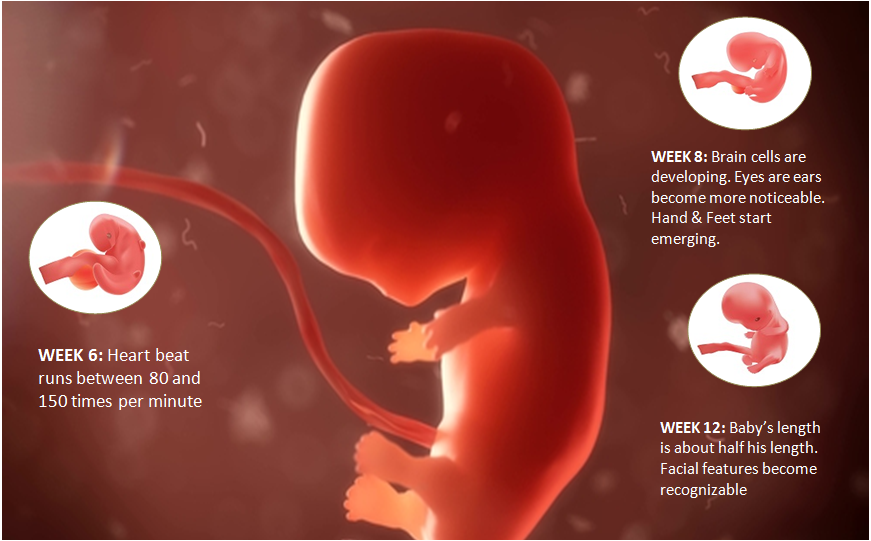First Trimester of Pregnancy (0 to 12 Weeks)

The first trimester of pregnancy is also known as the “invisible” or “silent” trimester. The reason for calling this trimester the ‘silent trimester’ is the fact that the woman’s body goes through an amazing transformation so quickly that quite often she fails to realize that she is pregnant until she is about 6 weeks into her pregnancy.

What is first trimester of pregnancy?
The first trimester of pregnancy ranges from the day of conception to week 12 of pregnancy.
Signs and symptoms of the first trimester of pregnancy
Mentioned below are some of the signs a woman should look for if she wants to find out whether her trimester has begun:
#1 Spotting
Many women may experience spotting, which is said as ‘implantation bleeding’. Nothing is worrisome about spotting, this is just another sign of pregnancy.
#2 Nausea
Nausea also known as morning sickness is quite common during pregnancy. High levels of B-hcG, the pregnancy hormone, begin to rise during first pregnancy and peak levels reach by the end of first trimester, which causes symptoms like nausea and vomiting.

#3 Frequency of Urination
Pregnant women have urge to urinate quite often as compared to normal women. This happens due to added pressure of the enlarging uterus onto the bladder. To prevent the occurrence of the urinary tract infection it is important that a pregnant woman should go to the toilet whenever the need arise.
Pain while urinating, burning or fever may develop if serious, should pregnant women seek medical attention.
#4 Fatigue
Sleep and fatigue is a direct consequence of rise in level of progesterone which occurs during pregnancy. This fatigue can be relieved by getting lots of rest and some mild physical activity such as walking.
#5 Heartburn and Constipation
Hormones released during pregnancy cause the food within the digestive tract to move very slowly. The tendency of food to stay for longer periods of time, inability of the digestive tract to digest food quickly leads the pregnant woman to suffer from constipation.
Similarly, pregnancy hormones relax the sphincter which separates the oesophagus from the stomach. Relaxing the sphincter is followed by continuous upward flow of stomach acid and subsequent irritation of the oesophagus thereby causing heartburn in the mother.

#6 Dizziness
Pregnant women might feel a bit dizzy. This occurs due to pregnancy hormones causing blood vessels to dilate and the blood pressure to drop. To avoid getting dizzy a pregnant woman should take care not to stand for too long and to rise slowly when lying down.
#7 Food cravings
A pregnant woman often develops cravings for different types of food. This behaviour in the mother is attributed to the hormones which are released during pregnancy. So just in case you are in your in your first trimester of pregnancy and are craving for your favourite brand of chocolates 12 o’clock at night, it is totally normal!

Tests performed during the first trimester of pregnancy
It is important for a pregnant woman to visit her doctor for advice and to get some tests carried out on her in order to make sure that both she and her baby stay healthy throughout the 40 weeks of gestation.
Mentioned below are some of the tests which a pregnant woman goes through during her pregnancy:
#1 Blood tests
Tests are performed on the pregnant woman to check for general health of women, the capability of woman to carry pregnancy till end, detect infections such as rubella, syphilis, hepatitis B and HIV. These tests also reveal whether or not a pregnant woman suffers from anemia as it may double the risk of developing anemia of pregnancy.
#2 Urine tests
Urine sample are taken from the pregnant woman to look for signs of urinary tract infection as well as to measure the level of B-hcG which is a hormone used to confirm the pregnancy of a woman. Level of glucose, which might indicate diabetes, is also checked via this test.
#3 Nuchal Translucency Scan
This is an ultrasound which is done on a pregnant woman in order to detect chromosomal abnormalities such as Down Syndrome, Edward syndrome etc, which the baby may be at risk of developing. This is not always performed.
#4 Chorionic Villus Sampling (CVS)
In this procedure a needle is inserted into the abdomen of the mother to collect samples of the placenta. Through this test genetic diseases such as Down syndrome, cystic fibrosis, sickle cell anemia, haemophilia and muscular dystrophy are detected.
What should a pregnant woman wear during the first trimester?
Your body doesn’t change a lot in the first trimester; you can wear whatever you wish. But it is advised you to keep a good collection of loose and comfy clothing for your next trimester use which brings a big transformation of body.
What is the average weight and length of the baby during the first trimester?
- The average weight of the baby during the first trimester is about 28 grams.
- The average length of the baby during the first trimester is about 10 centimetres.
Is sexual intercourse safe in the first trimester?
Sexual intercourse is considered safe during pregnancy, though women mostly get worried about the safety of pregnancy and usually avoid it. It is best advised to consult a doctor, if you had previous complicated pregnancy or pregnancy loss, get some guidelines from the doctor regarding safe sex during pregnancy.
What complications may arise in first trimester?
Women may be at risk of spontaneous abortion, miscarriages or ectopic pregnancy. These complications may arise due to abnormalities of uterus such as fibroid (an abnormal mass in the uterus causing abnormal per vaginal bleeding episodes and/or pain).It is more common in women with previous history of miscarriage or ectopic pregnancy.
How to prevent first trimester complications?
You can prevent yourself from developing the aforementioned complications during pregnancy by visiting your doctor as per schedule, give your complete history which includes your previous births and abortions, family history, medical conditions such as diabetes mellitus and if you are vaccinated or not. Get proper rest and a healthy diet.
Read more on your changing body during the first trimester of pregnancy here.


